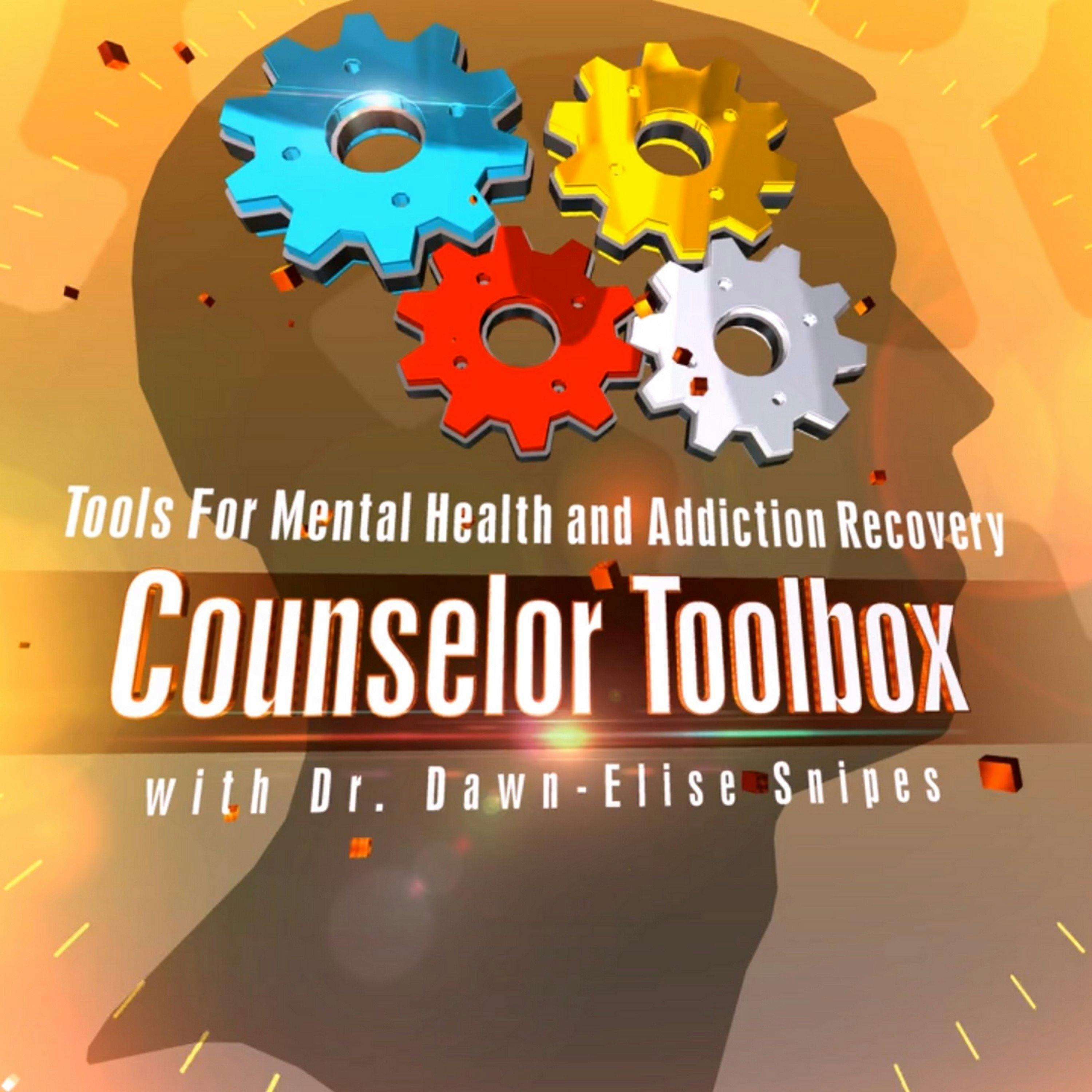

Counselor Toolbox Podcast with DocSnipes
Dr. Dawn-Elise Snipes
Counselors, coaches and sober companions help hundreds of thousands of people affected by Addictions and Mental Health issues each year. Learn about the current research and practical counseling tools to improve your skills and provide the best possible services. Counselor Toolbox targets counselors, coaches and companions, but can also provide useful counseling self-help tools for persons struggling with these issues and their loved ones. AllCEUs is an approved counseling continuing education provider for addiction and mental health counselors in most states. Counseling CEUs are available for each episode.
Episodes
Mentioned books

Mar 25, 2020 • 57min
Anger Management Multi-Session Protocol
Summary
~ Anger is a natural emotion. It is designed to alert people that there MIGHT be a problem.
~ When people are vulnerable or learned maladaptive ways of dealing with anger or simply never learned healthy coping skills they can experience anger management problems
~ Excessive anger negatively impacts people emotionally, mentally, physically, socially, occupationally, legally and spiritually.
~ Effective anger management involves preventing vulnerabilities, being aware of and working on “sensitive areas” or “threat areas,” preventing anger whenever possible and developing immediate coping responses to deal with it when it occurs. Learn more about your ad choices. Visit megaphone.fm/adchoices

Mar 21, 2020 • 37min
Moving from Supportive to Solution Focused Interventions
Summary
~ Supportive interventions are necessary to help people radically accept their feelings and situation and get into their wise mind.
~ Solution-focused interventions will help them address the situation and start moving forward to break the distress cycle. Learn more about your ad choices. Visit megaphone.fm/adchoices

Mar 21, 2020 • 14min
Finding Happy – Interview with Dr. Lindsay Weisner
Interview with Dr. Lindsay Weisner. Author of "Ten Steps To Finding Happy: A Guide to Permanent Satisfaction."
The book is available for pre-order at: https://amzn.to/2wmCTcU Learn more about your ad choices. Visit megaphone.fm/adchoices

Mar 18, 2020 • 45min
How Schema Affect Anxiety & Depression
Summary
- Schema are lenses through which we predict and interpret situations
- They are only as good as the knowledge and understanding of the situation
- Schema often need to be altered as we gain new information
Learn more about your ad choices. Visit megaphone.fm/adchoices

Mar 14, 2020 • 58min
Re-Release – Mental Health Aspects of Bariatric Surgery
- Learn about bariatric surgery
- Explore reasons for the surgery and increase in popularity
- Identify the psychosocial outcomes of bariatric surgery
- Identify common presenting issues in persons seeking bariatric surgery
- Explore current recommendations for assessment protocols and presurgical preparation for bariatric surgery
- Identify postoperative mental and physical health issues which may occur and need to be addressed
Types of Bariatric Surgery Learn more about your ad choices. Visit megaphone.fm/adchoices

Mar 12, 2020 • 49min
*Special Episode* CBT & Life Hacks to Cope with Public Health Threats
Summary
• There are many unknowns with the current coronavirus situation
• The flu is widespread and catastrophic for tens of thousands of people in the US each year and we do not panic.
• High levels of stress and anxiety however will reduce immunity and make people more susceptible to all types of illnesses
• Steps to reduce anxiety
• Get accurate information
• Limit your exposure to negative media
• Practice mindful acceptance of your reactions
• Use belly breathing to help de-escalate the physical anxiety reactions
• Identify proactive, positive ways to cope with the situation
• Regularly evaluate your beliefs against the FACTS at that time Learn more about your ad choices. Visit megaphone.fm/adchoices

Mar 11, 2020 • 38min
Dealing with Stress in Uncertain Times
Coronavirus, election anxiety and financial stress is getting to people right now. This is the audio version of a three part series just released on YouTube on dealing with that stress. Learn more about your ad choices. Visit megaphone.fm/adchoices

Mar 11, 2020 • 1h 2min
Psychosocial Elements or Terminal Illness
Summary
• End of life care often involves multiple providers, the client and caregivers
• It is essential to consider all biopsychosocial needs with a focus on integrative care
• “Stress” and distress will increase HPA-Axis activation, impair sleep and immunity and contribute to worsening of health and wellbeing of both the patient and caregivers.
• Children will need different approaches depending on their developmental level. Learn more about your ad choices. Visit megaphone.fm/adchoices

Mar 7, 2020 • 1h 5min
Re-Release – Creating Psychological Flexibility In Children
Every event is an opportunity to choose thoughts and behaviors that will help you use your energy to move toward your goals and values. Using the Flexibility Activity or worksheet youth can apply this on a daily basis. CEUs/OPDs are available for this podcast at allceus.com/counselortoolbox or if you are in Australia, Australia.allceus.com/counselortoolbox Learn more about your ad choices. Visit megaphone.fm/adchoices

Mar 4, 2020 • 52min
Metacognitive Therapy
Summary
• People can have millions of automatic cognitive distortions. Addressing each one may not be possible.
• Becoming aware of thought patterns, their function, their usefulness and alternatives underlies MCT.
• MCT moves from addressing the content of thoughts (What is being thought?) to the function of those thoughts (Why are the thoughts occurring and are they helpful?
Learn more about your ad choices. Visit megaphone.fm/adchoices


